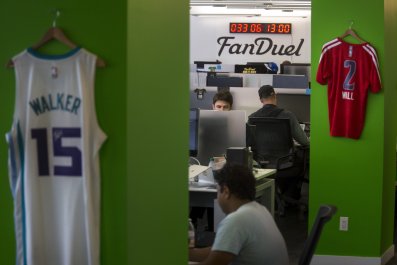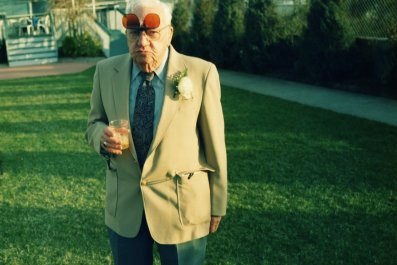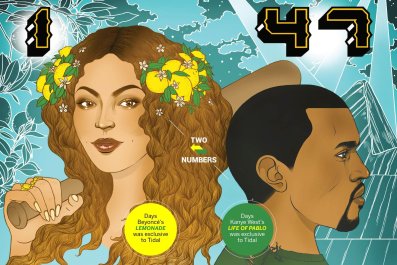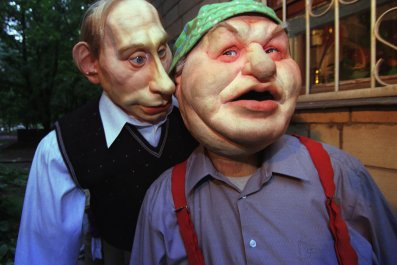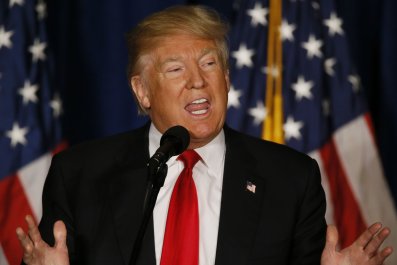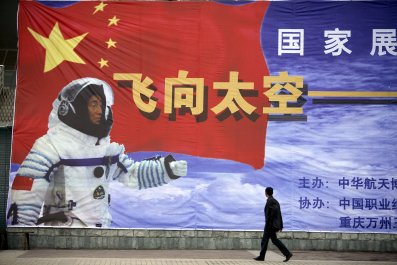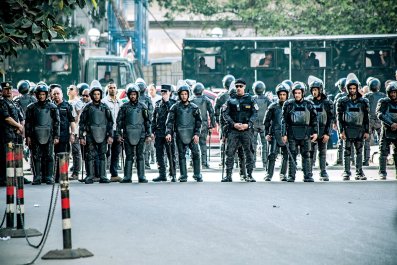Wall Street may be the heartless pillager of the American dream, but at least it has a sense of humor. The chaps in sweat-soaked Turnbull & Asser shirts trading weather derivatives have to know that what they do to earn a buck is preposterous, but as long as they're not the punchline, the joke continues. It is fitting that the cinematic version of The Big Short, the Michael Lewis book on the housing crash of 2008, was directed by Adam McKay of the less-than-somber Anchorman movies, who did his best to mine mortgage-backed securities for laughs. Only the creator of Ron Burgundy could explicate the sins of Angelo Mozilo and Dick Fuld.
In recent years, money and influence have been migrating from Wall Street to Silicon Valley, home of the digital economy and those willing to throw billions at halfway promising kombucha delivery startups. This is a disheartening development for those of us who like to laugh, because Silicon Valley has no use for laughter, which it appears to regard as a market inefficiency. For all the talk of apps that "delight," humorlessness hangs over the tech world like Bay Area fog. Finance guys replenish themselves—or at least used to, I have been told by reliable sources—with trips to Scores, mountains of cocaine and wading pools of gin. In Silicon Valley, coders fear to look away from their screens, sating themselves with jugs of Soylent, hydrating with electrolyte-rich water filtered through Indonesian lava rock. When they get their cinematic due, it will be from Ridley Scott.
Silicon Valley, the HBO series whose third season premiered on April 24, is television's most earnest attempt to laugh at the code ninjas without whom we'd have to live in a blandly analog world where you have to call for food delivery, raise a hand to hail a cab and read things on something called paper. The series was created by Mike Judge, the Zeus from whose brain sprung Beavis and Butt-Head, in which he used hapless young men to poke fun at American society while also poking fun at those hapless young men.
Nearly 25 years after the Great Cornholio first demanded TP for his bunghole, Judge's formula is essentially unchanged, with four members of the file-compression startup Pied Piper living in a stoner's shabby ranch house—sorry, residential coding collective—in Palo Alto, California. In the first season of Silicon Valley, Pied Piper won TechCrunch Disrupt, Silicon Valley's equivalent of an Olympic gold medal. In the second season, Pied Piper fended off a lawsuit by corporate behemoth Hooli (i.e., Google) and appeared, finally, to have fought off death, sated by the techie manna that is venture capital.
I have seen the first three episodes of Silicon Valley's third season, and as far as I can tell, they do not vary much in either tone or theme from the 18 episodes that preceded them. The founder of Pied Piper, Richard Hendricks (a nervous Thomas Middleditch eternally clad in a Zuckerbergian hoodie), has been deposed by investors as the company's head, replaced by Jack Barker, a bespectacled middle-aged technocrat in Brooks Brothers biz-cas attire, gratingly nasal and even more gratingly cocksure.
The new boss is played by the endearing Stephen Tobolowsky, here doing a superb impression of Eric Schmidt, who was charged in 2001 to turn "don't be evil" Google into a global corporate behemoth that would boil kittens alive for market share. Pied Piper once dreamed of radically speeding up the exchange of information with its revolutionary compression algorithm; Barker explains to his youthful charges that their idea will be difficult to realize and even more difficult to sell. He has a more sound plan: Instead of compressing data, Pied Piper will store it in a box. That is, a physical box, sitting in a server farm. It's not sexy, but it will scale. Even worse than a dream deferred, it turns out, is a dream fully funded.
Silicon Valley keeps things light, and in the style of Judd Apatow, it is wholesome even when it is salacious, which mostly involves masturbation jokes, bubbling bongs and mild, outworn ethnic jokes, usually at the expense of Asians. But the lightness is also a weakness, pulling Silicon Valley into silliness whenever it seems to be on the cusp of an insight about why the hills south of San Francisco, once carpeted with orchards, have become the object of world fascination, ambition and envy.
In a pivotal scene in the second episode of the third season, Hendricks confronts Barker, accusing him of being an interloper intent on destroying Pied Piper, which was to be the "global standard for file compression and storage," a technology on par with penicillin. "People who have nothing could suddenly have access to everything," Hendricks says. "You know, everybody in this industry, they say they wanna make this world a better place, but we could actually do it. We could do it—and make billions of dollars."
I have two complaints about this short speech. The first is that it is delivered in a stable, as two horses copulate off-screen. (They do it onscreen too—oh, the joys of cable.) The juxtaposition is funny but cheap, diminishing the force of the scene.
The deeper problem is Hendricks, whom Judge stuffs with every techie stereotype, from the anxious stutter to the uneasy combination of idealism and ambition. Whether Silicon Valley wants to make the world a better place, as the platitude has it, or make a billion, as SEC filings suggest, is a complex question—and there is no reason a comedy cannot tackle complex questions. Dave Eggers, in his brilliant Silicon Valley satire The Circle , did it. Judge, though, thinks equine sex can do the hard work of social criticism. It cannot.
Barker mocks Hendricks's idealism, explaining that "Pied Piper's product is its stock. And whatever makes the value of that stock go up, that is what we're going to make." Valuations are indeed the yearnings of Silicon Valley, highlighting the philosophical difference between value and worth. For example, how could biomedical testing company Theranos have been valued at $9 billion when its technology is worthless? Why is Uber valued so much higher than Lyft, when the service the two ride-sharing companies provide is identical?
The horse-humping scene is emblematic of Silicon Valley, which lurches between the serious and silly with disconcerting speed, vacillating like the stock price of a recently IPOed startup. Judge has clearly matured, but he still loves a dick joke.
Nicole Jones is one of the small group of women famous in Silicon Valley, though for an unfortunate reason. In 2015, it was reported that she and her two very young children were living in a San Mateo garage, which she had outfitted as a studio and was renting for $1,000 a month. Apparently, living in a garage is common in Silicon Valley, as is four or five families sharing a house intended for one. This has increased the density of certainty neighborhoods, leading to a problem that not even Silicon Valley has solved: the dearth of parking.
I get the complaints of longtime residents: Teslas aren't small. But tremendous pressures are at work, unleashed by some of the same people now bemoaning the parking crisis. As a housing advocate explained in a letter to the San Jose Mercury News, that city has a vacancy rate of 0.2 percent, the lowest in the nation. "It takes a wage of $54 an hour, or $112,500 a year, to afford the average two-bedroom, two-bath apartment in San Jose," the writer noted. The baristas and cashiers at the Stanford Shopping Center aren't quite making that.
I first heard about San Jose's parking woes from AnnMarie Zimmermann, who runs the Loaves & Fishes Family Kitchen, on the destitute east side of town. On the way there, I drove past a small homeless encampment; a much larger one, the notorious Jungle, was recently dismantled, as San Jose tries to lure tech companies fleeing the more expensive sections of Silicon Valley. Leaving the area later that afternoon, I drove past the campuses of tech companies, glass boxes fronted by ample parking lots. You pass from poverty to prosperity smoothly here, almost without noticing.
This contrast is commonly called inequality, though it is closer to unreality. Silicon Valley has created a digital world of rational efficiencies, but the people you see pushing shopping carts along the shoulder of Interstate 280 are stubbornly analog. There are visionaries in Silicon Valley figuring out how to store sunlight in batteries while others, not graced with the visionary spirit, get through the night by starting fires from piles of trash.
The poor are as invisible on Silicon Valley as they are in Silicon Valley. It may be better that way, since contact between the two cultures has tended to end in catastrophe. Earlier this year, "tech bro" Justin Keller wrote an open letter to the mayor of San Francisco in which he complained, "I shouldn't have to see the pain, struggle, and despair of homeless people to and from my way to work every day." His biggest sin was not callousness but honesty. He said what many here feel and whisper, but do not have the courage to tweet.
Zimmermann was once a high-ranking tech executive. She tells me that the kitchen "saved her soul," even if she is getting paid a fraction of what she once made. She is part of a small but potent group of Silicon Valley activists, people who do unglamorous work that the likes of HBO will probably not celebrate.
They do have an important new book: De-Bug: Voices From the Underside of Silicon Valley , oral histories edited by Raj Jayadev and Jean Melesaine, organizers at the social services not-for-profit Silicon Valley De-Bug. The stories are short and brutal, offering a corrective to the illusion of progress. Cecilia Chavez wrote about her father, a day laborer. "Don't deceive him or trick him into doing your job without you having the intention to pay him, like many others have done," she pleads. "K.S." is a member of the maligned metal scavenger tribe. "But don't get it confused," he says. "I don't steal or vandalize; I take and keep the environment clean." To add a rare note of levity, rickshaw driver Said Farah describes an encounter with the actor Bill Murray at a dance club in Carmel, a wealthy seaside enclave. More important than his brief contact with celebrity was the money he made that night: "I could actually afford a car wash."
The base material of De-Bug would make for far more sophisticated televisual entertainment than Silicon Valley. Not a comedy perhaps, but something more sophisticated, comic in one scene and tragic in the next, as moody and enthralling as the weather of the Northern California coast.
Silicon Valley as a place is far less compelling than it is as an idea: highways stringing together office parks, expensive suburbs sequestered in remote glades, shabby strip malls left over from a time before Choozle and Vingle ushered in a glorious new epoch for Western civilization. The land is green but featureless, like the terrain of a partially developed video game. Driving along Sand Hill Road, you would never know that behind its hedges toil the movers of global capital. I suspect they want it that way, lest someone feel the Bern a little too fervently.
In its suburban setting and its protagonists' thoroughly mainstream ambitions, Silicon Valley is a traditional American sitcom: It's pretty much Leave It to Beaver with Javascript and primo weed. And like its predecessors, Silicon Valley dutifully ignores the unruly parts of American life. Silicon Valley is frequently funny and sometimes very funny. I only wish it dared to be a little more disruptive.



